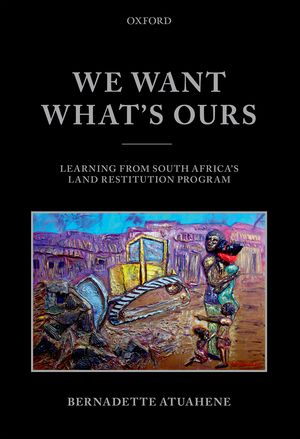
On countless occasions in history one group with political power has taken property from a less powerful group as part of a larger strategy to dehumanize or infantilize them. The colonial expropriation of property from native peoples, the Nazi confiscation of property from Jews, the Hutu taking of property from Tutsis during and after the Rwandan genocide, and Saddam Hussein's seizing of property from the Kurds in Iraq all typify this enduring phenomenon. In such instances, the dispossessed were subjected to deprivations of property and dignity. Subsequent governments then had to navigate the perilous landscape surrounding the return of land and other property to displaced or decimated populations. They could ignore the fact that people were deprived of their property, or they could rectify it. We Want What's Ours is a detailed study of South Africa's attempts to rectify the deprivation of land suffered by thousands of people under the colonial and apartheid regimes. It teaches a critical lesson about these transitions: remedying past wrongs entails more than distributing money or even returning property, because the dispossessed did not just lose their possessions, they also had their dignity taken from them. A comprehensive remedy for these 'dignity takings' involves confronting the underlying dehumanization, infantilization, and political exclusion that enabled the dispossession. That is, it requires 'dignity restoration' - a remedy based on principles of restorative justice that seeks to rehabilitate the dispossessed and reintegrate them into the fabric of society. South Africa's colonial and apartheid-era land dispossessions are a quintessential example of 'dignity takings', and the post-apartheid government is unique because it has sought to move beyond the more common step of only providing reparations (compensation for tangible losses) and instead has tried to facilitate the restoration of the dignity of the dispossessed. Bernadette Atuahene's detailed research, and extensive interviews with over one hundred and fifty South Africans who participated in the nation's land restitution program, demonstrates what was required for this 'dignity restoration', and how successful it has ultimately been. Rooted solidly in both academic analysis and human experiences, this book serves as an invaluable resource to international organizations, government bureaucrats, policy makers, NGOs, students, and scholars interested in redress for historical injustice, defending property rights, and conflict prevention.